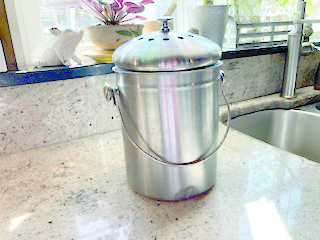Recycling Matters: Composting to reduce trash

By Maureen Harpell, RN, MSN, FNP
Bridgton Recycling Committee
I am passionate about avoiding unnecessary waste, of any kind. Perhaps, it is a lesson learned from my grandmother, who survived the Great Depression, but my husband and I work on the old Yankee adage of, “Use it up, wear it out, make it do or do without.”
Anyone who has worked with me has had me ask if I can take home their banana peels or leftover salads. “You are not putting that in the trash, are you?” I leave restaurants with “chicken” bags containing scraps from our meals including leftover rolls and cold French fries. At home, a compost bin sits on our countertop for food scraps, and is emptied into the chicken coop daily. Many of my friends do the same…it is the ultimate way of recycling. We return food to the earth and then feed the earth and our gardens with these decomposed nutrients. We can either turn our food waste into compost and avoid overburdening our environment or we can continue to turn a blind eye to this problem.
As the cost of disposing of our trash grows higher and the town of Bridgton considers a “Pay-Per-Bag” trash system for equity, it will cost more to fill those bags with food scraps. I would like to propose another way, a better way, of dealing with our food waste.
It is estimated by many sources that up to 25 to 33% of our household trash includes food scraps. It seems so easy to just throw something into the trashcan but, anything we throw away in Bridgton goes to ecomaine for incineration. The leftover ashes from that process are then taken to a landfill. Instead of worsening our environmental impact, by removing our food scraps from our household trash, we can save money (by purchasing fewer bags and less plant fertilizer), make great soil (wonderful nutritious soil additives) and avoid the environmental impact of adding to landfills or incineration.
As with all plant material, once the natural materials begin to die (consider fall leaves), the combination of beneficial microorganisms including bacteria and fungi, along with water and oxygen, start the process of decomposition. As food decomposes, it makes heat, breaks down into component parts and returns these nutrients to the earth. When we place our garden/kitchen waste in plastic bags we stop this life-giving process, leading to unnecessary incineration or landfill of this valuable resource.
Composting is easy. And we have great options here in Bridgton.
To begin:
•Take all of your food scraps (see details below) and place them in a container with a lid.
•The container can be as small as an old plastic food container to a five-gallon bucket. Multiple options are also available online. Consider banana peels, coffee grounds, ends of bread, ends of carrots/celery, onion skins, leftover rice and all “non-meaty” leftovers.
•Bring this collection to either: the Bridgton Transfer Station (Tuesday, Thursday and weekends); your backyard compost pile; a worm bin (resources below); a friend who always wants more organic material; give them to your chickens, or a friend who has chickens (hint, hint!)
Material to include:
•Fruit and vegetable scraps
• Coffee grounds and coffee filters, tea bags
• Egg shells, nut shells
• Newspapers, paper napkins, paper towels (avoid shiny or colored paper)
• Printer paper
• Yard waste, grass clippings, leaves
• Wood shavings, sawdust, hair and fur
• Avoid meat scraps, cheese and dairy. A little is okay, but not a lot.
How to make your own compost system:
•Find a corner of your yard, or build a structure to hold the materials. A three-sided pallet, a round bin with chicken wire, old boards or concrete blocks or anything to hold the material in place will work. Our first system was a place in the yard, where we emptied the lawn mower grass clippings and added kitchen scraps.
•Layer browns (dried grasses, old leaves, cardboard, paper towels, etc.) with greens (coffee grounds, old lettuce, carrot peelings, leftover green beans, etc.) and dampen to the consistency of a wrung-out sponge. With browns (dried grasses or leaves) on top, the risk of odor or flies is minimal. Toss with a pitchfork every several days to make sure that air and oxygen gets into the pile. Cover if needed with more browns, wet it if too dry. That’s it…
Our town transfer station will mix yard and household wastes with heavy machinery and create compost. Look to the left when you pull into the transfer station.
• Compost is completed when you cannot define the original materials, and it smells healthy. This usually takes between 6 to 18 months, depending on multiple factors. Now, take that great material and place it in a garden, around houseplants, or in your yard.
For anyone who would like more information about composting, please see the resources below or e-mail the BridgtonRecycleCommittee@yahoo.comor me at maureenharpell@gmail.com. We will host educational gatherings and information on LRTV.
Reference material:


